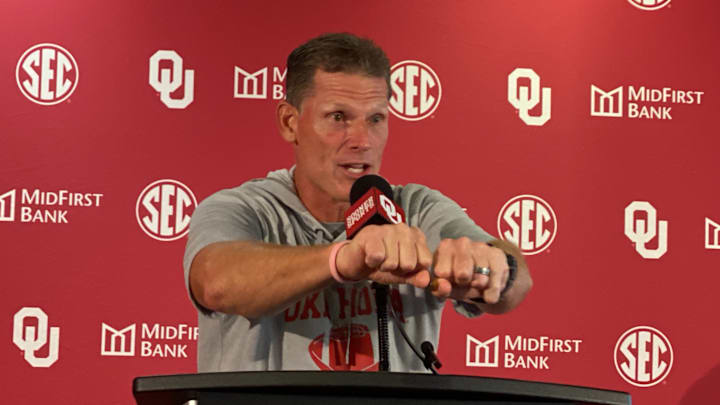COLUMN: Brent Venables Takes On the Most Pressing Question: How Do You Fix the Offense?

NORMAN – It was probably pie in the sky to think that Brent Venables would entertain my question Tuesday about Oklahoma’s game plan processes in the offensive meeting room.
But I had to try.
Hey, sometimes Venables is more revealing than you expect. He can start down a path and ultimately shed light on some things that no one expects.
I didn’t have much hope that his answer this time would be all that revealing. But truly, it’s what the fan base cares most about coming off a dismal offensive performance in the Sooner’ 25-15 loss to Tennessee last Saturday night. It was a bad loss to a good team, but like Venables said during his nearly hour-long press conference, there’s still a lot of football to play – and it starts Saturday with OU’s first road trip, a 2:30 p.m. kickoff at Auburn.
So I took a stab at getting some real answers.
“Without giving any state secrets to Auburn, can you describe the offensive game planning process during the week, how you lead up to the game, who’s doing what, how much collaboration there is between the position coaches and the co-coordinators, and then what you like about that process, and maybe what you’d want to see tweaked about that process?”
I know, I know. That’s asking a lot – literally.
"That's a pretty long conversation,” Venables confirmed. “But it is everybody (on the offensive coaching staff), and you use depth of experience, and then there's an evaluation for this is what we have, this is where we're at, this is what we do well, this is what we don't do well. This is what we need to do better. If one guy does this better, if we get a better snap, if we eliminate some of the communication (issues). Again, if we're all wrong, we're all right. So all of that goes into it.
“And then again, there's a philosophy of running the ball, pushing the ball down the field, attacking the ball downhill in the run game. and you've gotta create explosive plays. So how do you do that? You've gotta have some balance in your offense, your ability to be efficient running the ball, to create some potential explosive plays. Who can beat one-on-one coverage? If they're playing us like this this week, and we've got a good matchup, a friendly matchup, then let's go take advantage of it. And so you, sometimes, you have that, and sometimes you don't.
“So you evaluate personnel, you evaluate scheme, you evaluate how it relates to your opponent, what they're good at, what they're not good at, what we can't allow to happen in this game plan. And, again, you know, strategy 101, is to take away what they do best, you know, attack it. And so, always easier said than done, I know. But that's got to be a thoughtful process. And so it is, like I said, it's a collaboration. You work through it. Here's where we start on Monday, and then here's the different areas that we're working and emphasizing on Tuesday and Wednesday, and then Thursday, so forth and so on. Really, all the way to game time, you're, you're still dotting the I's and crossing the T’s, I think if you're doing your due diligence as a coach.
“So there's no way that could have satisfied what you're asking for in a 2 1/2-minute answer. But that's that.”
After watching the OU offense struggle four weeks running, we’re all curious about offensive coordinator Seth Littrell’s decisions to put certain players in certain positions (like tight end Bauer Sharp, who says he struggles as a blocker, being asked to block extensively), or run certain plays in certain situations (like the Sooners’ meat-and-potatoes inside handoff plays behind an offensive that is clearly struggling to move anyone off the ball and yet there were repeated middle runs against a supremely talented Tennessee defense that owned the line of scrimmage and limited OU to 1.1 yards per carry).
Much like the previous two years when Jeff Lebby was the Sooners’ offensive coordinator, I’m curious to know if the OC has complete autonomy or are there checks and balances? Lebby, for instance, thought running up-tempo offense was a good idea with a lead, rather than slowing down the pace to shorten the game. Is anyone questioning Littrell in the endless meetings Venables’ staff sits through? Is there a layer of oversight? Is anyone offering suggestions? Do running backs coach DeMarco Murray and wide receivers coach Emmett Jones and offensive line coach Bill Bedenbaugh have any real input? What is co-coordinator and tight ends coach Joe Jon Finley’s role in the game-planning through the week?
These are questions that can’t be fully explored in the final minutes of a moderated press conference that has already run 20 minutes over.
I was hoping Venables could tackle what elements of the weekly process he likes and what he’d like to see changed. But I asked what changes he anticipated making in a previous press conference, and while his answer was forthcoming – more physical practices – it seems to have not produced much of a solution.
Venables did continue to express that he wants to simplify things for the players on the field.
“Don’t give too much autonomy,” he said.
As for OU quarterbacks trying to execute the run-pass option plays (RPO), Venables said over and over, it’s simple enough: the quarterback gets the snap, makes a quick read and determines whether to hand the football off or throw it to a receiver.
But he also acknowledged that yes, it can be simpler.
“Sometimes, it’s complicated,” Venables said, “but we could uncomplicate and tell him to hand the damn ball off. You don’t have to have an RPO to have a good play. And so, it’s not like every play’s an RPO. Tennessee, pretty much was.”
Venables’ opening statement on Tuesday was 19 minutes. He repeatedly got into the weeds on specific plays from Saturday night, explaining what should have happened against what actually happened. He didn’t seem to have many answers, but certainly raised more questions.
“We gotta get better,” he said. “Everybody knows that. We’re not playing very well on offense right now.”
Answers should come in meetings and at practice this week, but not at a press conference.
Coaches, Venables said, need to “put them in a position where we can effectively communicate and execute. That’s a basic expectation. we’ve been incredibly inconsistent that way.
“You’re either coaching it or you’re allowing it.”
